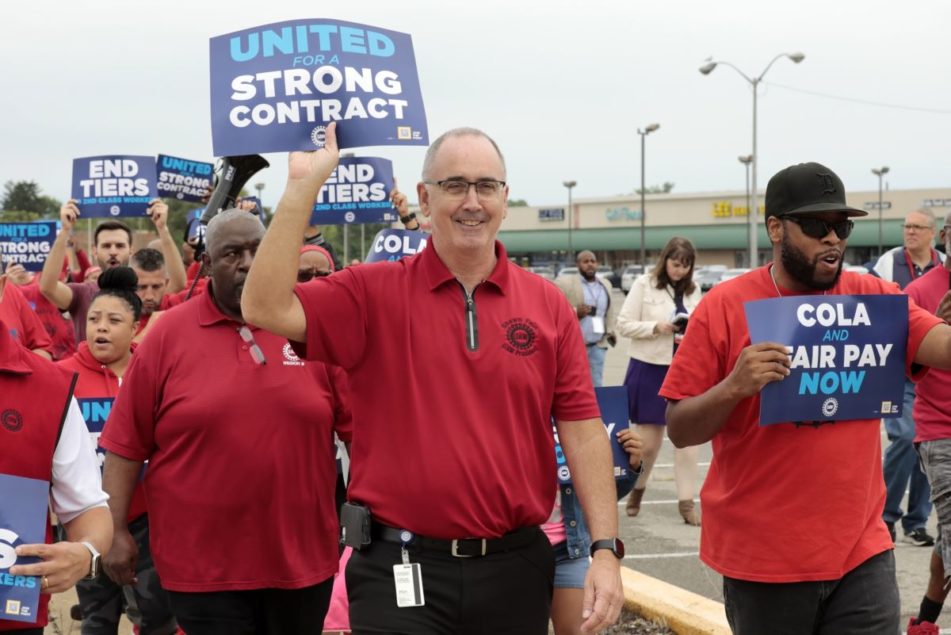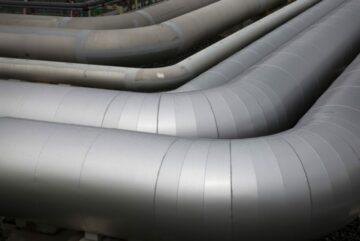
Ford Motor Co. is calling on the United Auto Workers to end its more than month-long strike, warning that if the work stoppage continues it will hurt both local communities and the broader U.S. economy.
“I call on my great UAW colleagues,” executive chair Bill Ford said in remarks delivered at the historic Rouge factory built by Henry Ford in Dearborn, Michigan. “We need to come together to bring an end to this acrimonious round of talks.”
The union began its walkout on September 15 after a four-year contract expired, targeting plants run by Ford, General Motors Co. and Stellantis NV, which owns the Jeep and Ram brands. UAW President Shawn Fain has kept the three major Detroit automakers guessing, calling a surprise strike at Ford’s largest factory — its Kentucky Truck Plant — on October 11.
“Shutting down that plant harms tens of thousands of Americans right away,” said Ford, the great-grandson of company founder Henry. “If it continues, it would have a major impact on the American economy and devastate local communities.”
Ford shares rose as much as 1.3% in trading October 16, before paring the gains to trade at $11.91 at 12:41 p.m. in New York. The stock has gained 2.5% this year.
The union’s decision to stop work at Ford’s facility in Kentucky was a major escalation since that site makes higher-priced Super Duty versions of F-Series pickups and Lincoln Navigator and Ford Expedition large sport-utility vehicles.
Landen Bradshaw, a body shop worker at the Kentucky Truck Plant, said while picketing the night of October 15 in Louisville that it was “surreal” to learn he’d be going out on strike. “I wish it didn’t have to come to this, but here we are.”
But Bradshaw said the strike was necessary to force the company to address workers’ declining real wages: “People shouldn’t have to work here and have a second job.”
Relations between Ford and the union have traditionally been better than those the UAW has had with GM and the former Chrysler. But in recent weeks, Ford has signaled its unhappiness with the pace of progress in the talks and chief executive Jim Farley has taken issue with UAW head Fain’s decision not to meet with Bill Ford before the strike deadline.
Bill Ford warned October 16 that the longer the strikes last, the more it helps non-union competitors such as Toyota Motor Corp., Honda Motor Co. and Tesla Inc.
“Toyota, Honda, Tesla and the others are loving this strike because they know the longer it goes, the better it is for them,” Ford said. “They will win and all of us will lose.”
- SEO Powered Content & PR Distribution. Get Amplified Today.
- PlatoData.Network Vertical Generative Ai. Empower Yourself. Access Here.
- PlatoAiStream. Web3 Intelligence. Knowledge Amplified. Access Here.
- PlatoESG. Carbon, CleanTech, Energy, Environment, Solar, Waste Management. Access Here.
- PlatoHealth. Biotech and Clinical Trials Intelligence. Access Here.
- Source: https://www.supplychainbrain.com/articles/38290-ford-calls-on-uaw-to-cease-acrimonious-strike
- :has
- :is
- :not
- ][p
- 1
- 11
- 12
- 15%
- 16
- 41
- 91
- a
- address
- After
- All
- American
- American economy
- Americans
- an
- and
- ARE
- AS
- At
- auto
- automakers
- away
- BE
- because
- been
- before
- began
- Better
- between
- Bill
- Bloomberg
- body
- both
- brands
- bring
- broader
- built
- but
- by
- call
- calling
- Calls
- Chair
- chief
- Chief Executive
- chrysler
- CO
- colleagues
- come
- Communities
- company
- competitors
- continues
- contract
- Corp
- deadline
- decision
- Declining
- delivered
- down
- economy
- end
- escalation
- executive
- Facility
- factory
- For
- Force
- Ford
- Former
- founder
- gained
- Gains
- General
- General Motors
- GM
- Goes
- going
- great
- had
- harms
- Have
- head
- helps
- henry
- henry ford
- here
- historic
- HTTPS
- Hurt
- if
- Impact
- in
- IT
- ITS
- jeep
- Jim
- Job
- jpg
- Kentucky
- kept
- Know
- large
- largest
- Last
- LEARN
- Lincoln
- local
- longer
- lose
- loving
- major
- MAKES
- Meet
- Michigan
- more
- Motor
- Motors
- much
- my
- Navigator
- necessary
- Need
- New
- New York
- night
- NV
- october
- of
- on
- Others
- out
- owns
- Pace
- plant
- plants
- plato
- Plato Data Intelligence
- PlatoData
- president
- Progress
- RAM
- real
- recent
- right
- ROSE
- round
- Run
- s
- Said
- Second
- September
- Shares
- shawn
- Shop
- since
- site
- stock
- Stop
- strike
- Strikes
- such
- Super
- Talks
- targeting
- tens
- Tesla
- Tesla Inc
- than
- that
- The
- Them
- they
- this
- this year
- those
- thousands
- three
- to
- together
- toyota
- trade
- Trading
- traditionally
- truck
- u.s.
- U.S. economy
- union
- United
- us
- Vehicles
- wages
- warning
- was
- we
- Weeks
- which
- while
- will
- win
- with
- Work
- worker
- workers
- would
- year
- york
- zephyrnet











